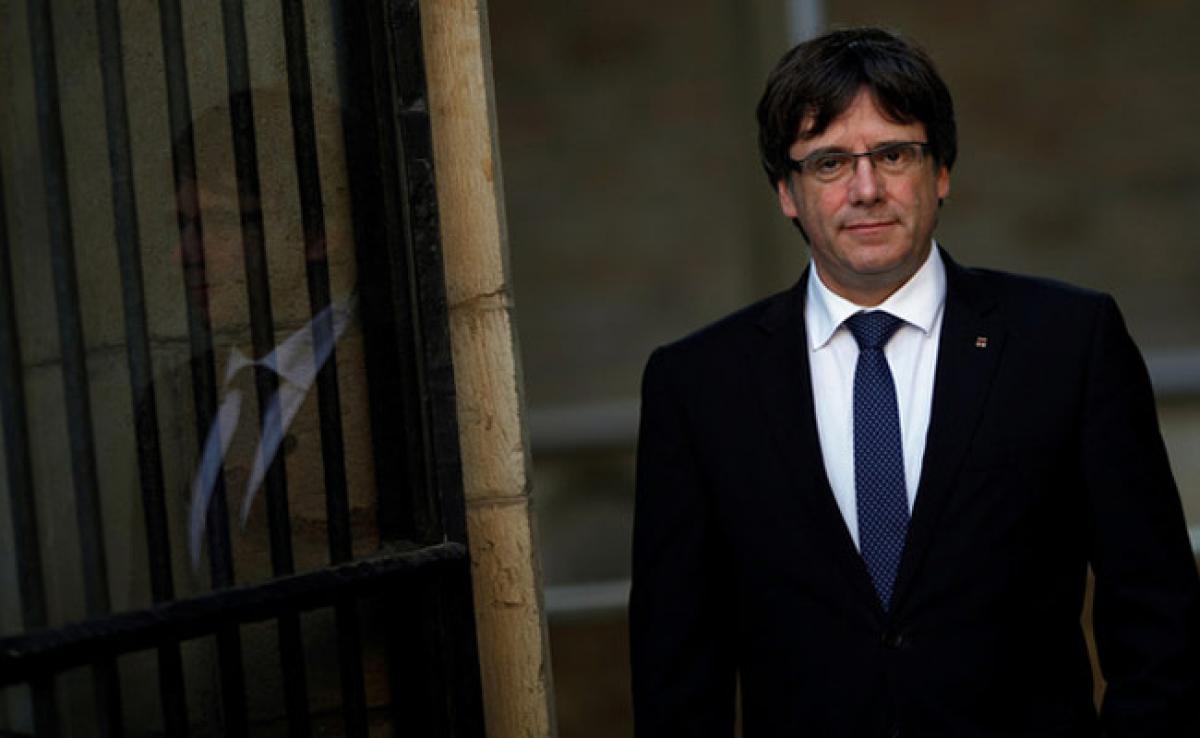Live
- ‘Get Set, Grow Summit 2024’ Focuses on Digital Detox for Families
- Stokes motivates his team to put in extra effort, says England pacer Potts
- From overcoming setbacks to leading India in U19 Women’s Asia Cup, Niki Prasad's amazing journey
- Driving Enterprise Security: Inside Venkata Reddy Thummala’s Leadership Journey
- Constitution debate: PM Modi hails 'Nari Shakti'; makes strong pitch for 'United Bharat’
- Abhijeet Bhardwaj: Revolutionizing Enterprise Analytics with Innovation and Expertise
- Bihar: Inquiry initiated against principal who went to buy veggies during school hours
- Press Sri Lankan Prez for release of Indian fishermen: TN Cong MP to EAM Jaishankar
- TN: DMK postpones executive meet due to heavy rains & Parliament session
- Porous silicon oxide electrodes can fix durability issues in batteries: Researchers
Just In

Catalan leader Carles Puigdemont called Saturday for \"mediation\" to resolve the \"serious\" conflict pitting his executive against the central government, on the eve of an independence referendum banned by Madrid.
Catalan leader Carles Puigdemont called Saturday for "mediation" to resolve the "serious" conflict pitting his executive against the central government, on the eve of an independence referendum banned by Madrid.
"If the yes wins, if the no wins -- in any scenario there must be mediation, because things aren't working," he told AFP in Girona, the Catalan city which he led as mayor from 2011 to 2016, when he became regional president.
Vowing that he and his supporters would not "give up" their rights and would vote on Sunday, he called on Catalans to maintain a "peaceful attitude."
As the vote nears, Puigdemont said he was "trying not to let emotions take over," insisting that talks with Madrid would be inevitable.
The standoff between the central government and Catalan leaders over their plans to hold an independence referendum has morphed into one of the biggest crises to hit Spain in decades.
Madrid argues the vote is illegal as the courts have ruled it unconstitutional, and has banned it.
But Puigdemont and his team insist Catalonia has a democratic right to decide on its future.
Opinion polls show the wealthy, northeastern region is deeply divided over independence, but a large majority of Catalans want to be able to settle the matter in a legal and binding vote.
Puigdemont did not call on any specific person, organisation or country to mediate, but he hinted that the EU may be well placed to do so.
"I think that from now it would be logical for the EU to actively monitor (the situation) and actively take an interest," he said.
"If it doesn't take an interest in what is happening in Catalonia when everyone is watching and taking an interest, there's something wrong," he said, accusing the EU of "looking the other way."
- 'Emotional estrangement' -
Puigdemont reiterated his call on the Spanish government to negotiate over holding a legal, binding referendum, and again promised to call the entire vote off if the state agreed.
But this is unlikely to happen.
Thousands of police have been deployed to Catalonia to stop the vote, millions of ballot papers seized, key referendum organisers detained, and websites promoting the vote shut down.
On Saturday, Spain's interior ministry said police had sealed many of the 2,315 polling stations around Catalonia to stop people from voting, although activists occupied at least 160 of those to try and allow people in anyway.
Puigdemont though insisted that his government had "everything in place so that everything takes place normally."
Under a law approved by the regional parliament earlier this month, the Catalan government has said it will declare independence soon after the referendum if the "yes" wins.
But Puigdemont said: "We all know there is a period of transition, that there isn't an automatic button to trigger independence."
"So in the law, we have not envisaged a declaration of independence as a mechanism with immediate effects."
He said there would need to be "dialogue" with Madrid.
"How can we not talk when we are brothers, we speak similar or identical languages, we share the same culture and we have family links, economic interests?".
Both Catalonia's leaders and Madrid have mutually accused each other of refusing the other side's offer of talks over the years.
Puigdemont said Catalonia's pro-independence movement was born from "an emotional estrangement from the Spanish state."
Where the referendum is concerned, he said that many Catalans would have wanted Madrid to provide "more convincing arguments than the need to respect the law and the police."
Arguments like "we need you, we love you."

© 2024 Hyderabad Media House Limited/The Hans India. All rights reserved. Powered by hocalwire.com







